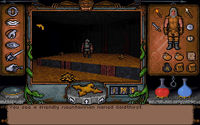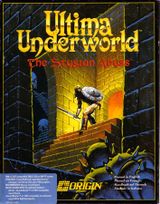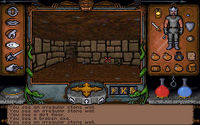Ultima Underworld: The Stygian Abyss
This article is about the first game in the Ultima Underworld series. For other uses, see Ultima Underworld (disambiguation).
This article is about a game. For the dungeon, see Great Stygian Abyss.
Ultima Underworld: The Stygian Abyss is a computer game developed by Blue Sky Productions (later Looking Glass Studios) and published by Origin Systems in March, 1992. It is part of the Ultima series. In 1993, a sequel Ultima Underworld II: Labyrinth of Worlds was released.
Gameplay[edit]

The game was born from a concept brought to Origin by Blue Sky of a "simulation style" RPG using advanced 3D engine technology that was later combined with the Ultima gaming universe created by Richard Garriott. It was released before and featured significantly more complex technology and gameplay than the exceedingly popular Wolfenstein 3D by id Software, but had higher system requirements. Id Software programmer John Carmack has himself said that the engine used for Wolfenstein 3D was inspired by a technology demonstration of the first Ultima Underworld game.
The Story[edit]
Spoiler warning: Plot and/or ending details follow.
On the Isle of the Avatar, a colony was built in the Abyss to promote Virtue by the highly ambitious Sir Cabirus, who thought that it could lead to all races living together in peace. Unfortunately, the colony failed after his death, and the differences between the races again broke open. Thus, in the end the Abyss became a prison.
The player is cast in the role of the Avatar, the protagonist of the Ultima series. After being drawn back to Britannia by an apparition of a dead wizard named Garamon, the Avatar witnesses the kidnapping of Baron Almric's daughter Arial by the wizard Tyball. However, the wizard escapes and the Avatar is caught by the baron's guards and taken before Almric. The Avatar is found guilty of the kidnapping and banished to the Great Stygian Abyss, to either rescue the baron's daughter or perish within. The player has to deal with the survivors of the failed colony and, after rescuing Arial, discovers a plot by Tyball to summon a daemon, the Slasher of Veils, into Britannia. The Avatar manages to banish the daemon with the Talismans of Sir Cabirus and escape the Abyss, thus proving his innocence, although this causes the Abyss to erupt violently.
In relation to the main Ultima series, the game takes place between Ultima VI and Ultima VII.
Spoilers end here.
Development[edit]
Ultima Underworld was originally only called Underworld and had no relations to the Ultima series, which explains the appearance of some rather unusual races in Britannia. The game was later integrated into the Ultima series at the suggestion of Richard Garriott, who was still fondly attached to the idea of 3D dungeons in Ultima games, even though he ended up removing them in Ultima VI.
Differences Between Platforms[edit]
Ultima Underworld was originally exclusively produced for the IBM PC. A port for the Japanese FM Towns computer was made, but it is an exact copy of the original, apart from sporting music in CD audio format.
Then in 1993, a port for the PC-9801 was released by Origin and Electronic Arts Victor (EAV) in the format of 3.5" and 5.25" disks. Although it first came in 256 colors, a later version in 1994 had 16 colors. The box contained a set of translated manuals, a slightly different paper map and an ankh-shaped paper knife as trinket.
Several years later in 1997 there was a Japanese release of the game for the PlayStation. Most the storyline is identical between the ports except for a few key differences. The introduction and endgame sequence of the PlayStation-port consists of a cinematic movie using completely new graphics. The PlayStation port uses 3D models for all in-game characters. All menus have been altered in the PlayStation version to compensate for the system's lack of keyboard or mouse. Read more here: PSX-port of Ultima Underworld.
Translations[edit]
Ultima Underworld is one of the first games which shipped with part of its documentation translated in foreign markets. However, the game itself and the book Memoirs of Sir Cabirus remained in English in most international editions, the Spanish version contains all documentation in Spanish, including the clue book. Only the installation guide had French, Spanish, Italian and German sections. Of note is that the Japanese FM Towns-port and the Taiwanese edition have fully translated manuals.
The remake for the PlayStation is completely in Japanese. However, a fan translation is availbale (see below).
Release[edit]
Despite its technical excellence, and being voted the top role-playing game of 1991 by Computer Gaming World,[1] the game was not a great financial success. Today the game has a cult following among fans of the Ultima series, in some abandonware circles, and by the occasional nostalgic early 1990s gamer. In 1993, Ultima Underworld won the Origins Award for Best Fantasy or Science Fiction Computer Game of 1992.
It was later also released in the Underworld Series and also in a bundle together with Wing Commander II.
Ultima Underworld (as well as Ultima I and ten other classic games) was available on the July 2000 issue of PC Gamer Magazine (CD-ROM edition).
Included with the game[edit]
The release of Ultima Underworld included these things with the game:
- The book Memoirs of Sir Cabirus.
- A paper map of the first level of the Abyss.
- Bag with six metallic rune stones (which appear in the game).
The Japanese FM Towns and the PC-98 version came with an ankh paperknife trinket.
Legacy[edit]
Ultima Underworld inspired the Wolfenstein 3D engine:
- "According to id Software programmer John Carmack, the game's engine was inspired by a technology demo of Looking Glass Studios'/Origin's first-person CRPG, Ultima Underworld: The Stygian Abyss from 1991. Carmack claimed he could make a faster renderer. In this he was successful. The Wolfenstein engine lacks many features present in the Underworld engine, such as height changes, sloped floors and lighting, but it runs well on relatively weak hardware."
Ultima Underworld also partially inspired The Elder Scrolls: Arena.
Availability[edit]
Ultima Underworld and Ultima Underworld II can be purchased from Good Old Games at Ultima™ Underworld 1+2.
Upgrades[edit]
Genral MIDI Patch[edit]
Ultima Underworld has only one upgrade available: A patch to convert the music for General MIDI usage instead of Roland Sound. Download it here: MIDI patch
PSX Translation[edit]
The Ultima Underworld PSX Translation is a patch that translates the PSX-version to English. For more, see the respective article.
More Game Related Information[edit]
- NPCs
- Runic magic
- Bugs
- Cut NPCs in Ultima Underworld
- Cheating in Ultima Underworld
- Ultima Underworld Real-life references and Easter eggs
- Ultima Underworld walkthrough
- Skill system of Underworld and Underworld II
- Ultima Underworld internal formats
- Guide to lizard men language
- Magic item locations in Ultima Underworld
- Key locations in Ultima Underworld
- Character creation in the Underworld games
- Training in Ultima Underworld
Trivia[edit]
- Towards the end of the game, a spell that will destroy all life can be learned. If cast, all other creatures, items, doors and even stairways are destroyed, leaving only the walls, floors and ceilings.
- Despite the mispronunciation of "Stygian" during the introduction, the correct pronunciation is stij-ee-uhn.
- Narrator in the introduction is voiced by Brian Martin.
- A completion certificate could originally be obtained after winning the game. This is the only one not from Lord British. It is from Baron Almric.
Gallery[edit]
External Links[edit]
- Ultima Underworld: The Stygian Abyss on Wikipedia
- StygianAbyss.com – UW 1&2, Arx Fatalis and, Dark Messiah information site
- Through the Looking Glass forums – a site dedicating forums to several games, including Underworld
- Underworld Adventures – a discontinued project to recreate Ultima Underworld on modern operating systems, using the original game files.
- Ultima Underworld on Ultima Aiera
- UnderworldGodot – a Godot-based port of Ultima Underworld and Ultima Underworld II that replaces Underworld Exporter, the Unity-based port.
References[edit]
- ↑ Computer Gaming World, Number 100. November 1992. Page 110.
This article includes material originally taken from Wikipedia article Ultima Underworld: The Stygian Abyss. Wikipedia material is licensed under GNU Free Documentation License.
| Ultima Underworld Intro Cinematic |












